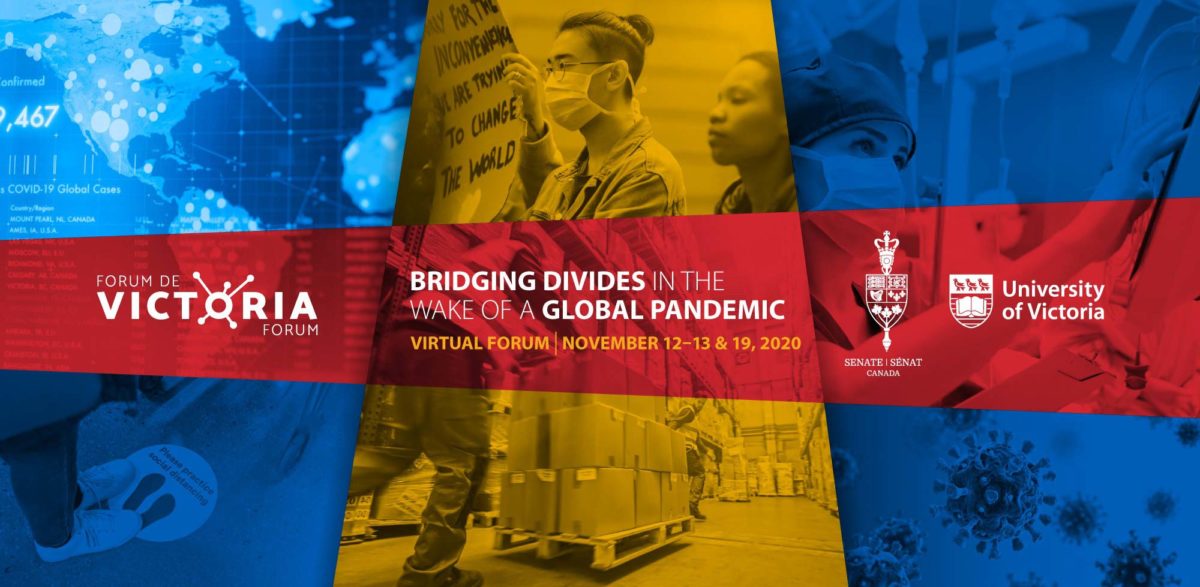Leaders in business, politics, Indigenous knowledge and academia gather to discuss global challenges

Global issues require global solutions – and the participants of the 2020 Victoria Forum enthusiastically embraced the challenge. The online forum, jointly hosted by the University of Victoria and the Senate of Canada, focused on moving towards solutions for the social, economic, and environmental divides that have been illuminated and exacerbated in the wake of the global pandemic. Senior political and business leaders from around the world joined Indigenous knowledge keepers, academics, youth, and NGOs in three days of in-depth discussions on Nov. 12, 13, and 19.
The Victoria Forum is a meeting place for changemakers, says Saul Klein, forum chair. It is a non-partisan, inclusive space that champions evidence-based conversation and actionable solutions. Originally envisioned as a small workshop event to discuss Canada’s role in the world leading up to the country’s 150th anniversary, the Victoria Forum has doubled its reach in this year’s virtual conference.
The inaugural forum in 2017 saw 500 participants gathered in Victoria, focussing mainly on local and national affairs. This year, over 1600 people from 93 countries registered for the event. The topics were as international and diverse as the speakers and their audience. Overall, there were close to 100 panelists from 23 countries.
“The thing that unites everyone that would like to participate is that desire to make a difference, and their unhappiness with the status quo,” said Klein. Bringing people from a broad range of backgrounds into one conversation adds different perspectives and encourages collaborative approaches in seeking solutions.
“People talk at each other more than they speak to each other,” he said. “If somebody is not in the room, you can talk about them. If they’re in the room, you have to talk with them.”
Attendees helped shape the round-table discussions through a live Q&A, and lenses of truth, trust, and turf guided the plenary conversations.
“There’s a real question in terms of what is true,” said Klein. “There is the erosion of trust, particularly in key institutions, where individuals have deliberately tried to erode trust as part of building their own support basis. And then … the issue of turf, which picks up both issues of land and disputes about land, but also the sense of ownership of ideas.”
Over the course of the forum, participants tackled a variety of topics. They discussed the importance of civic leadership – investigated through the lens of combating systemic racism – and the role of universities in providing high quality higher education. Finance experts debated the potential of FINTECH (innovative financial technology), particularly in developing countries, and Indigenous knowledge keepers provided insight into the inclusion of Indigenous values and teachings in our democracy.
Panelists called upon communities and individuals alike to recognize that the issues we face are not merely academic or technical. They emphasized that these are profoundly human challenges, and require patience and empathy. While exacerbated by the pandemic, most of the problems are not new. Speakers in numerous sessions highlighted that the effects of the pandemic vary by region and demographic, but that they are universal and will not disappear with a medical solution for COVID-19. There is no vaccine for hunger, poverty, or inequality.
Policy-makers were reminded by the presenters that age doesn’t matter when making a difference and were asked to create space for youth to network and assume leadership roles in democracy. All attendees were urged to interrogate their privileges and to boldly challenge complacency.
The most frequently mentioned component to sustainable and actionable solutions was multilateral and interdisciplinary collaboration. The speakers emphasized that we must acknowledge that not all voices are present in the conversation, and we must work together if we wish to move forward.
The long term goal of the forum is to stimulate continuous discussion around the forum topics. Klein says they hope to keep the conversation going over the course of the next year through online webinars and small events.
“We’d like to see this become an ongoing dialogue,” said Klein. “Our ultimate objective is to influence decision making, whether it’s at a policy level from political leaders, or whether it’s business decision making, or even the activities of NGOs. We’re committed to trying to make a difference and not just talk about making the difference.”






